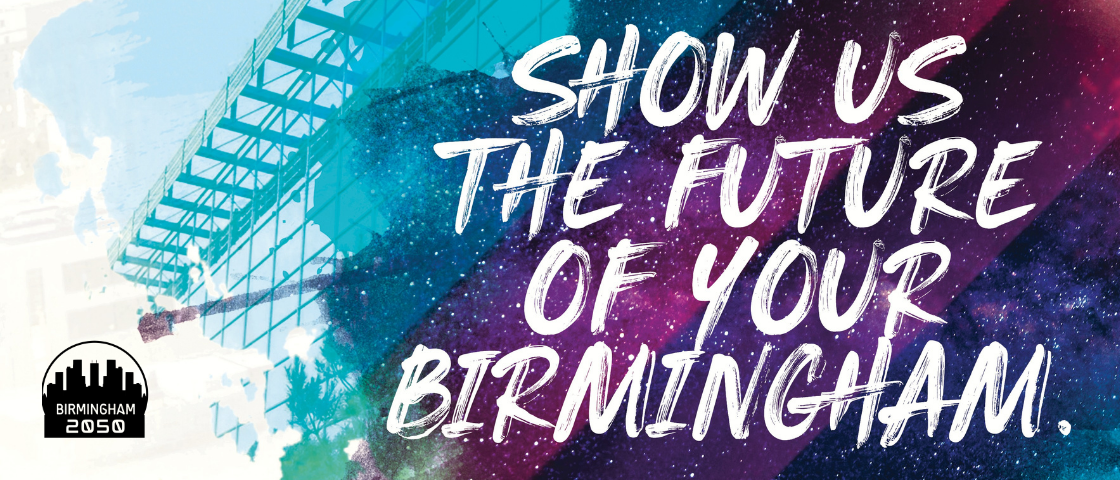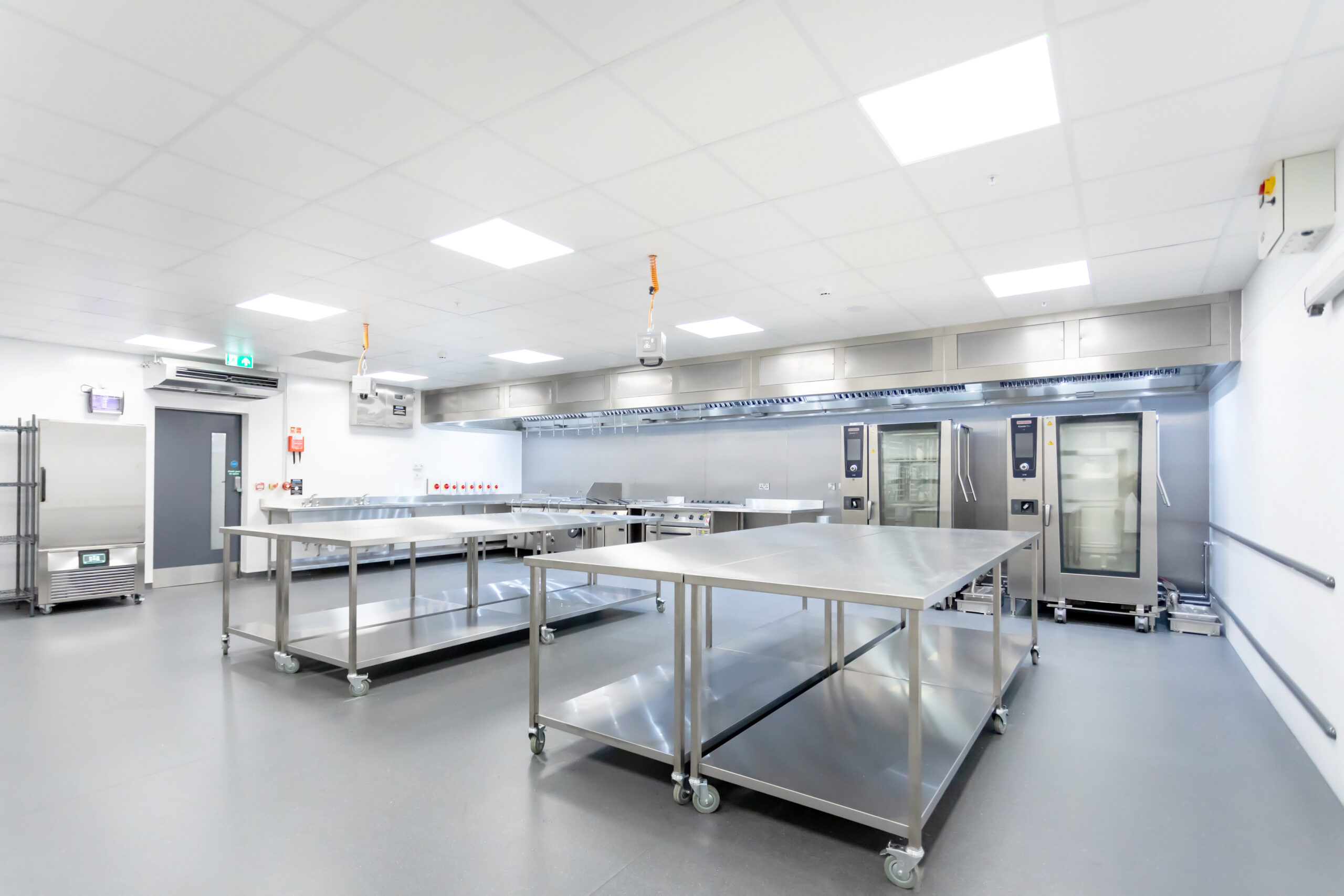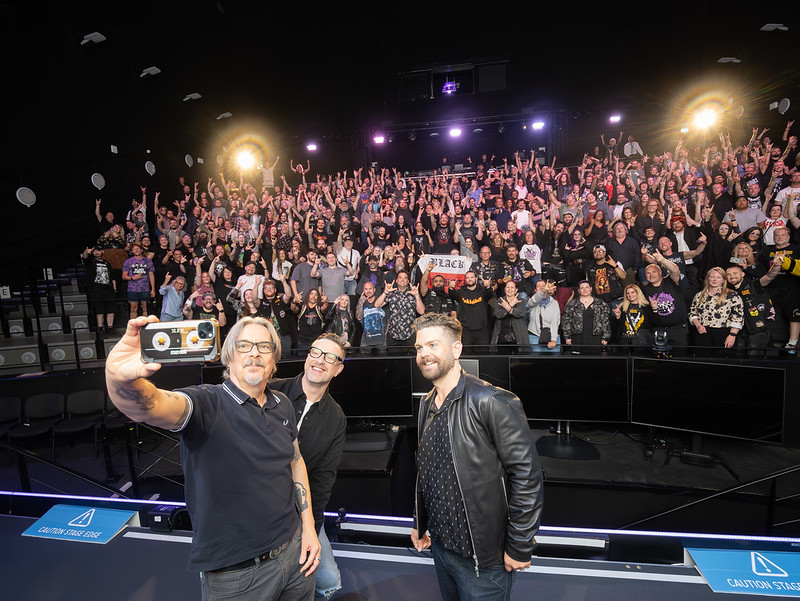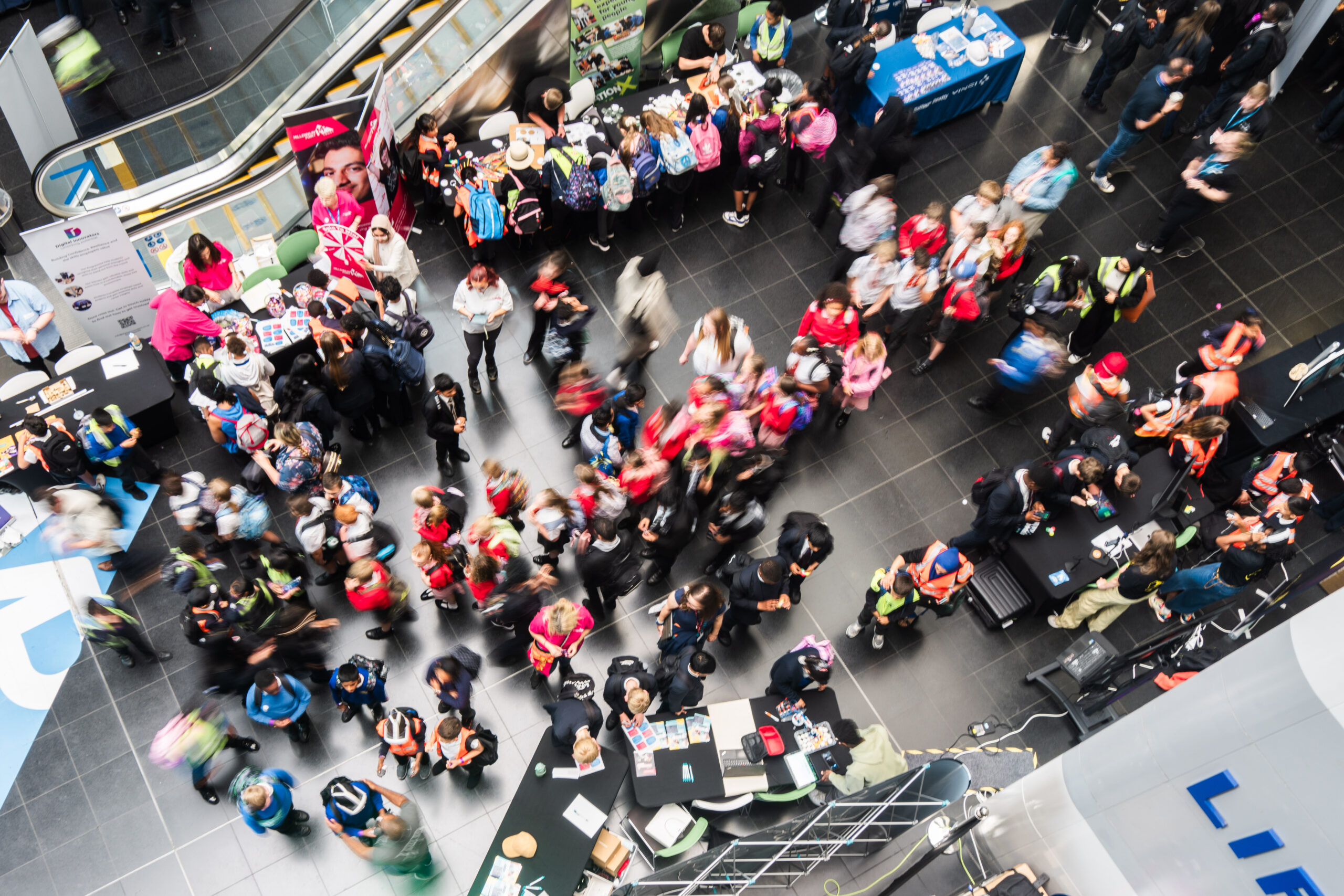A major new creative campaign is calling on people across Birmingham to imagine what the city could look like in 2050, and it kicks off this month with a chance for the public to start submitting ideas straight away via an easy-to-use digital platform at birmingham2050.co.uk.
Birmingham 2050 launches as a city-wide call-to-action aimed at artists, designers, musicians, poets, schools, community groups, businesses and residents. The campaign invites submissions in any creative form, from traditional artwork and models to writing, music, digital design and video. It just needs to be something that can be uploaded to the digital portal.
On 24 and 25 March, a public booth will be set up at Millennium Point where residents can drop in to share their ideas about what they want Birmingham to be like in 2050. The two-day installation is designed to capture what people across the city are thinking and hoping for, with contributions feeding into the wider campaign.

The initiative arrives at a pivotal moment for Birmingham. With major infrastructure projects underway, significant cultural momentum building and long-term development reshaping the city’s landscape, organisers say the campaign is designed to channel that energy into public imagination, particularly among young people who will inherit the city being built today.
Entries will remain open until just before schools break for summer holidays. And a curated selection of submissions will be showcased in a public exhibition and live event at Millennium Point in September, featuring music performances, a live mural artist and creative visions gathered from across the region.
Abbie Vlahakis, CEO of Millennium Point, said:
“Birmingham has always been a city of makers and thinkers. Right now, it is also a city on the rise. Birmingham 2050 is about giving people permission to imagine what comes next and to share that openly. We want young people in particular to feel that their ideas matter and that the future of this city belongs to them as much as anyone. That is at the heart of what we do at Millennium Point.”
She added: “People need hope and direction. This campaign is about optimism, creativity and community. It’s an open invitation to help picture the Birmingham we want to build together.”
The campaign is backed by Millennium Point, with submissions open now at birmingham2050.co.uk.
Millennium Point Trust has opened applications for a 2026 scholarship, inviting ambitious West Midlands students to apply for a fully funded undergraduate degree at Birmingham City University.
Delivered through the Millennium Point Charitable Trust, the scholarship removes tuition fees for one successful applicant, enabling them to focus fully on their studies and future career without the burden of student debt.
Now in its 12th year, the programme reflects a sustained partnership between Millennium Point Trust and Birmingham City University, designed to support students whose ideas, drive, and potential can make a lasting difference to the West Midlands.

The scholarship has previously supported students across disciplines including computer science, real estate, and engineering, with recipients going on to apply their learning to some of the region’s most pressing challenges, from digital skills gaps to housing and regeneration.
Abbie Vlahakis, CEO of Millennium Point, said:
“Each year, the scholarship reminds us just how much talent exists across the West Midlands. Our role is to remove barriers where we can, so that potential is not limited by circumstance. This programme is about backing people early and giving them the space to develop skills that will shape the region’s future.”
All commercial activity at Millennium Point feeds directly back into its charitable work, helping to fund scholarships, education initiatives, and support for organisations across the region. Over the last decade, this approach has helped direct more than £45 million back into the West Midlands through financial support, discounted rents, and long-term investment in learning and opportunity.
Applications for the 2026 Millennium Point Trust Scholarship are now open. Full eligibility criteria and application details can be found at: www.millenniumpoint.org.uk/scholarship
Millennium Point brought together 200 of Birmingham’s business leaders, previous scholarship winners, journalists and influencers on Thursday 6 November for a Christmas tree lighting party. Rock legend Dave Hill from Slade led the countdown and hit the button to light up the 39ft Christmas tree, one of Birmingham’s tallest, which features 23,000 energy saving LED lights.
He was joined by Abbie Vlahakis, the venue’s CEO, with His Majesty’s Lord Lieutenant Derrick Anderson CBE and the Lord Mayor of Birmingham among the guests.

The evening showcased Millennium Point’s new onsite kitchen, with AC Catering designing a specially crafted festive menu for attendees, while also raising awareness for Help Harry Help Others (HHHO), a charity supporting children and young people facing adversity.
Entertainment came from Mr & Mrs Grey, who performed Ozzy Osbourne’s ‘Mama, I’m Coming Home’, and Black Sabbath’s ‘Changes’, with both songs paying tribute to Ozzy following his recent passing and as a nod to his enduring legacy to Birmingham’s musical heritage. They also performed Slade’s ‘Cum on Feel the Noize’, while Dave Hill watched on.

The celebration capped off a full day at the venue, which had earlier hosted a STEM roundtable. Featuring leaders across STEM industries, primary and secondary education, further education, higher education and not-for-profits in the STEM Sectors, the event underlines Millennium Point’s commitment to advancing science, technology, engineering and mathematics education alongside its public event programming.
Rebecca Delmore, Commercial Director at Millennium Point, said: “This evening perfectly encapsulated what Millennium Point represents, a space where Birmingham’s past, present and future come together. From hosting crucial STEM conversations during the day to bringing our community together for celebration in the evening, we’re proud to be a venue that works as hard as the city itself.
“Seeing Dave Hill light up our Christmas tree, welcoming community leaders, supporting charities like HHHO, and showcasing what our new kitchen can deliver, reminds me why this venue matters. We’re not just hosting events, we’re creating moments that connect people across every sector of Birmingham life. That’s what drives us every single day.”
Millennium Point has unveiled a brand-new £700,000 commercial kitchen, built to cater for up to 1,000 guests per day and designed to elevate the venue’s event experience while driving forward its sustainability ambitions.
The kitchen, created in partnership with AC Event Catering and designed by DSA Consultants, means the award-winning city-centre venue is now able to deliver a seamless onsite catering service for conferences, exhibitions, banquets, and private events. By removing the need for external kitchens or temporary facilities, organisers will benefit from smoother logistics, reduced environmental impact, and greater flexibility in menu design and delivery.

A commitment to sustainability
The fully electric kitchen underlines Millennium Point’s commitment to sustainability. It eliminates the use of natural gas across the site and is future-proofed to integrate with renewable energy sources such as PV and carbon-neutral shippers as they come online. This move not only enhances green credentials but also reduces operational emissions for every event held at the venue.
For event organisers and delegates, the advantages are clear: faster service, fresher food, improved efficiency, and the assurance of sustainable practices at every stage. The investment represents a step-change for Millennium Point as it continues to cement its reputation as one of Birmingham’s leading event destinations.
Rebecca Delmore is the Millennium Point’s Commercial Director: “There are so many reasons the launch of a brand new, onsite kitchen at Millennium Point is a real investment in the future at Millennium Point. Of course, in the near future, it’s an excellent step forward for us, but the real value lies in it as a long-term commitment to the venue being more and more sustainable, and continuing to improve the experience for attendees at our wide range of events.
“Our events service an incredibly diverse range of interests and issues, and being able to provide organisers and guests with fresher, higher quality, locally sourced food — all prepared onsite — is a massive step forward and one that showcases our commitment to the community and the betterment of the venue and its work.”
Millennium Point welcomed fans from far and wide on Friday (4 July) for the world cinema premiere of The Nine Lives Of Ozzy Osbourne, a powerful and unflinching portrait of Birmingham’s most iconic rock legend. The event featured two packed screenings, with the later show followed by a special Q&A with Jack Osbourne in front of a sold-out audience.
The Nine Lives of Ozzy Osbourne
The film, which traces Ozzy’s amazing journey from his working-class roots in Aston to international rock stardom, was shown on Birmingham’s biggest screen — a fitting venue for an evening celebrating perhaps the city’s most recognisable icon. With candid reflections on the ups-and-downs of what has been one hell of a career, and footage that captures the grit, chaos and brilliance of Ozzy’s life, the film leaves fans with something truly memorable.

Jack Osbourne, who appears throughout the documentary, joined the audience for a live discussion after the 6.30pm screening. His presence added a much-welcomed personal touch to the evening, and he gave some rare insight into the making of the film and his father’s legendary career.
He was joined on stage by the film’s director, Greg Johnston, who said that “Being able to share the theatrical debut of our film with fans who came from all corners of the world in Ozzy’s hometown of Birmingham was such an honor and privilege.”
A fantastic weekend in Birmingham, filled with Ozzy Osbourne fans
Playing host to this event was also important to the team at Millennium Point. Abbie Vlahakis is CEO at the venue: “Being a part of this monumental occasion for this incredibly creative and talented city was an honour for us at Millennium Point. Ozzy is a global superstar, no doubt. But here in Birmingham, he is a local legend and someone the city holds dear. We hope everyone that visited for the weekend’s events had an amazing time and comes back again soon.”
The premiere at Millennium Point was part of a landmark weekend for Birmingham, taking place just one day before Ozzy’s final ever live show, Back to the Beginning, at Villa Park on Saturday (5 July). The concert marked an emotional end to a groundbreaking career, and featured a historic reunion with original members of Black Sabbath. Other acts to appear on the day included some of rock and metal’s biggest names, in Pantera, Slayer, Metallica and Guns N’ Roses.
Proceeds from the premiere are being donated equally to Cure Parkinson’s, Birmingham Children’s Hospital, and Acorns Children’s Hospice, adding a lasting legacy to an already unforgettable night.
Birmingham‑born Atiyyah Zafar has been awarded the 2025 Millennium Point scholarship, giving her a fully funded place on Birmingham City University’s Computer Science with Artificial Intelligence course, positioning her to join the UK’s next wave of ethical AI talent.
Employers have been warning that Britain could be 150,000 digital specialists short by 2030, so judges felt Atiyyah’s commitment to building AI tech is a sound investment in the future, emphasising why investing in local talent matters now more than ever.
The former Joseph Chamberlain Sixth Form College student is the 11th winner of the scholarship and intends to focus on AI tools that help close the digital skills gap in the West Midlands — an area that, apparently, the area is falling behind in. She said:
“Winning the scholarship made me feel really validated, and like all my efforts had been seen. It feels like this is the first time I’ve been able to actually voice my opinions about what’s going on in the West Midlands. A lack of digital skills has led to high unemployment, growing inequality, and increased online risks in the region. Many people struggle due to limited access to resources, fast-changing technology, and a lack of education.”
Abbie Vlahakis, CEO of Millennium Point, added: “Atiyyah is evidence of our belief that it’s important to back bright minds early. You’re not just changing a life, you’re strengthening the region’s future workforce. And with the potential for a digital skills crisis in the near future, it is this exact sort of thing we need to be backing.”
Last year’s recipient Patrick Mezzano is now studying Real Estate at BCU after impressing judges with his affordable‑housing ideas, underlining how the scholarship channels talent into sectors crying out for fresh thinking.
Over the last 10 years, the Millennium Point trust has supported organisations in the region with more than £45 million — including discounted rents, donations, scholarships and other support.
Award-winning venue and charity, Millennium Point, welcomed over 1,000 local school children to explore the world of engineering at its free SciENGINEERING Showcase on 10 June. The event offered students an exciting day of hands-on workshops, live demonstrations, and inspiring talks from leaders in the engineering sector.
A host of leading organisations—including Thinktank, The Air League, Rolls Royce, British Army, Birmingham, BOM & BCU STEAMhouse —joined forces to deliver engaging activities and insights into careers in engineering. From structural design challenges to robotics and sustainable tech, students got a glimpse into the innovations shaping our future.

Abbie Vlahakis, CEO of Millennium Point, said:
“It is incredibly rewarding to open young minds to the possibilities within engineering. Events like SciENGINEERING are vital in showing students how they can shape the world through creativity, problem-solving, and innovation.”
The SciENGINEERING Showcase was part of Millennium Point’s annual Sci-series, designed to improve access to STEM (science, technology, engineering, and maths) careers for young people across the West Midlands. This year’s event spotlighted roles such as civil engineers, robotics technicians, and environmental engineers through fun, interactive experiences.
With over £45 million invested in STEM education across the region, Millennium Point continues to empower the next generation of engineers and innovators.
Delivering an impactful STEM event takes more than a great idea — it takes planning, experience and a dedicated team. At Millennium Point, we’ve spent years developing a programme of events that excites pupils and supports teachers.
Our events are built around real-world STEM concepts, from sustainable engineering to space science. Behind the scenes, our education and event teams work together to design interactive workshops, presentations and guided tours that fit school learning goals.
Every school is different, and our team helps tailor events in line with curriculum areas, age groups and SEN considerations, while also considering the changing shape of the job market. Our on-site staff handle set-up, safeguarding and technical logistics.
Visits often include a screening in our giant screen Auditorium, and hands-on sessions where pupils get to build, test or create. We also provide downloadable pre-visit and post-visit materials so teachers can extend the learning back in the classroom.
It’s not just about the day itself — it’s about the longer term impact. We want pupils to feel inspired and curious, and give teachers the support they need to make STEM education come alive. That’s what makes a Millennium Point event more than just a trip — it’s an experience designed to last.
Artificial Intelligence (AI) is rapidly becoming a practical tool in education, and one of the most accessible options for teachers is ChatGPT. Whether used for planning lessons, generating resources, or offering pupils a new way to explore topics, ChatGPT can add real value to the classroom.
Teachers under time pressure can use ChatGPT to quickly draft lesson plans, suggest classroom activities or even create worksheets tailored to specific learning objectives. For example, a science teacher might prompt it to generate quiz questions on STEM-related topics or write a script for a role-play about climate change.
ChatGPT can also support differentiated learning. With the right prompts, it can produce simplified or advanced versions of the same content to meet the needs of diverse learners. It’s not a replacement for teachers’ knowledge and experience, but it can offer a powerful starting point.
There are also ways pupils can benefit directly. Encouraging older students to ask ChatGPT research questions can help develop critical thinking and digital literacy, provided they are guided on how to assess and evaluate responses.
At Millennium Point, we’re seeing how AI fits into the broader picture of STEM education. Our workshop events explore real-world applications of technology, and we encourage teachers to integrate digital tools into their teaching practice.
Used thoughtfully, ChatGPT can be a valuable ally in making lessons more dynamic and responsive.
The final weeks of term are the perfect time to reward students with a trip that combines fun, curiosity, and a hint of inspiration. For Birmingham-based teachers planning an educational yet enjoyable day out, the city offers several excellent options that can complement classroom learning and create lasting memories.
Thinktank Birmingham Science Museum: A STEM-Focused Favourite
Located within Millennium Point, Thinktank is a top choice for schools seeking a trip that’s both educational and interactive. Managed by Birmingham Museums Trust, Thinktank offers curriculum-linked activities across science, technology, engineering, and maths (STEM). Highlights include the Science Garden, Planetarium, and engaging workshops suitable for all key stages.
While Millennium Point itself does not offer school trip packages, it supports STEM education through the Millennium Point Charitable Trust, which funds initiatives across the West Midlands to enhance learning opportunities. Schools looking to enrich their curriculum with hands-on science can benefit from both the museum’s facilities and the broader educational ecosystem in and around the venue.
Expand the experience: Outdoor & cultural add-ons
Make the most of your day out by exploring the Eastside City Park, just outside Thinktank. With ample green space and water features, it’s ideal for lunch breaks or post-museum downtime. For groups interested in cultural enrichment, nearby attractions such as the Library of Birmingham or Birmingham Museum and Art Gallery can add variety to the itinerary.
Planning your visit
Teachers can book directly through Birmingham Museums Trust for Thinktank visits. Pre-visit materials, risk assessments, and optional add-ons like workshops or planetarium shows are available. The venue is centrally located with good transport links, coach-friendly access, and facilities that support school group needs.